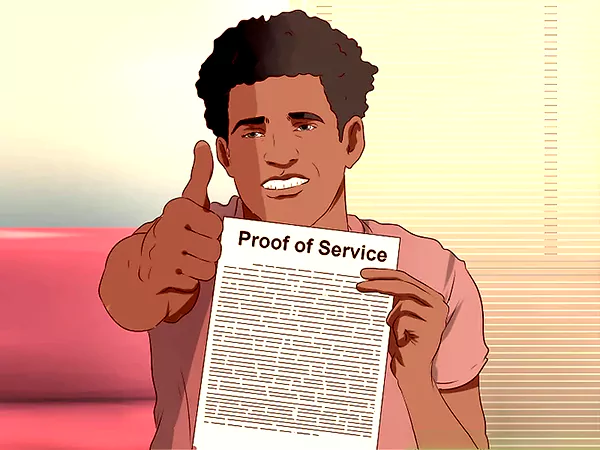

So, you’re curious about the process of serving legal papers in California, huh? Well, you’ve come to the right place. First off, let’s get into what this “process of service” means.
In legal terms, it’s the formal way of informing someone that there’s legal action against them.
Think of it as the law’s way of saying, “Hey, you need to come to court.” This isn’t just some casual heads-up, mind, please.
There are strict rules about how this must be done to ensure everyone gets a fair shake in the legal system.
Imagine while watching a movie, someone knocks on the door, hands over an envelope, and says, “You’ve been served.”
Is that person doing the serving? That’s a licensed process server in cities like Sacramento. These folks have a job that’s vital to the legal process.
They deliver court documents to the person named in the lawsuit. Now, they can’t just tape it to your door.
They must follow specific rules to make sure they have genuinely been informed about the legal action they are facing.
Typically, these are professionals trained in the law, so they know how to do this by the book.
Why would someone want to serve papers, one asks? There are a bunch of scenarios.
It could be for a divorce, a civil lawsuit, or even a restraining order. The point is, that you’re being called to participate in a legal process.
Do You Know?:
California’s court system serves a population of more than 40 million people. It is about 12.1% of the total U.S. population and processed about 5.3 million cases in fiscal year (FY) 2019–20.
These papers lay out why someone is being asked to come to court. In some cases, one might even be the plaintiff—the one initiating the lawsuit.
In that case, get copies of the legal documents to confirm that the other party has been served.
Alright, let’s dive into the different ways one can serve these legal documents. There’s not just one-size-fits-all here; several methods are legally accepted.
First up is what they call “personal service.” This is the most straightforward way to get the job done.
A process server physically hands you the documents. No middleman, no gimmicks. Get the papers directly from the server’s hands.
This is the gold standard, really. Why? Because there’s no room for doubt. You got the papers, being known you’re involved in a legal action, end of story.
But what if someone is a slippery character who’s hard to pin down? Enter “substituted service.”
This method allows the process server to give the writings to someone else living in the home.
We’re talking adults here, so don’t worry about that 10-year-old accidentally becoming the messenger for a lawsuit.
Substituted assistance usually also involves mailing a copy of the documents, just to cover all bases. More on who can accept these documents in a bit.
Next, we have a facility through certified mail. This is a bit more passive but still effective.
The documents will be sent via certified mail with a return receipt requested. That way, there’s proof one got them.
Keep in mind, though, that this method might not be acceptable for all types of cases. Some matters require the personal touch of direct assistance.
Finally, we’ve got service through publication. Now, this is the last resort, the Hail Mary of serving documents.
When all else fails, and the person can’t be found, their name goes into the press. The court needs to approve this method first.
Once they do, the legal notice appears in a newspaper that the missing person is likely to read. After that, it’s a waiting game to see if the person turns up.
Okay, after comprehending the methods, let’s chat about some of the hurdles one might encounter. Because, let’s be honest, not everyone is thrilled about getting served, right?
Let’s start with a classic problem: dodging assistance. Yep, some people think they can avoid legal issues by avoiding the process server.
Nice try, but not effective. Remember substituted service? If the person being served is dodging the process server, those documents can go to another adult in the household.
It’s also possible to get court approval to use unconventional methods. So, if someone’s pulling a Houdini, there are still ways to catch them.
Another interesting question is if it is possible to refuse service. Short answer? No, you can’t. I mean, give it a shot, but it won’t end well by any means.
If identified, and the documents are in your general vicinity, you’ve been served. Some people think if they don’t touch the papers, they’re in the clear.
Nope, it doesn’t work like that. The court’s not going to let a technicality like that slide.
So, what happens if the process server plays detective but just can’t find the person? Well, that’s when things get creative.
The court might allow assistance by publication. In extreme cases, a judge might even allow service via email.
However, this is rare and usually requires proving that every other method has failed.
We’ve covered a lot of ground so far, but now let’s get into a topic that might be surprising. We’re diving into who can accept those legal papers on someone’s behalf.
It’s not just a free-for-all, so listen up!
Can someone else accept your legal papers? The quick answer is yes, but it comes with some caveats.
For instance, in the case of substituted usefulness, the person must be an adult living at the same residence. So, the roommate? Fair game.
Your visiting aunt? Not so much. Plus, the server usually must mail a copy afterward to make sure you really, truly know what’s happening.
Now, wondering, “How will I even know if someone else took these documents for me?” Great question.
The process server will leave documentation letting one know they’ve been served. If the papers come via mail, you’ll usually have to sign a return receipt.
That way, the court knows you got the message.
To conclude, let’s talk about how process servers cover their bases. They can’t just hand over the documents and call it a day.
There’s a document called a “Proof of Service” that needs to be filled out.

This shows the court who got the writings when they got them, and how they got them. It’s the process server’s way of saying, “Job well done, your Honor.”
